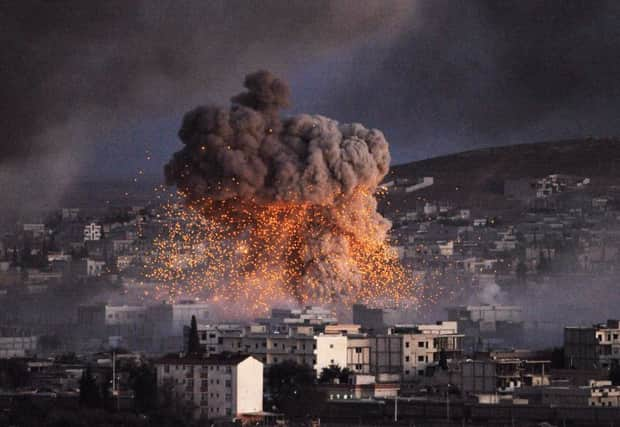Cameron: Stop laying blame for terror on Iraq War


The Prime Minister will signal his intention to help the US “destroy” the militants’ “brutal realm” with a vote in parliament on expanding military action from Iraq is expected in September.
Mr Cameron’s speech today follows revelations last week that RAF pilots embedded with US and Canadian forces have already taken part in operations in Syria, despite a vote by MPs in 2013 forbidding military action in the country.
Advertisement
Hide AdAdvertisement
Hide AdCritics including former first minister Alex Salmond have suggested a link between the war in Iraq and the rise of Islamic State (IS), also known as Isis or Isil, which is responsible for mass beheadings and rapes.


In June, Mr Salmond said on the BBC’s Question Time: “It isn’t impossible or even difficult to construct a narrative that the western world has been responsible for chaos in many Islamic countries.
“Therefore it might be a great deal of assistance in constructing a counter- narrative if, for example, we collectively as a society might apologise for an illegal war in Iraq.”
In his speech, Mr Cameron will say: “This argument, the grievance justification, must be challenged.
“So when people say ‘it’s because of the involvement in the Iraq War that people are attacking the West’ we should remind them: 9/11 – the biggest loss of life of British citizens in a terrorist attack – happened before the Iraq War.”
He will also hit out at those who opposed the UK’s involvement in protecting Muslims in Kosovo, including Mr Salmond who called it an “unpardonable folly”.
Mr Cameron will say: “When they say that these are wronged Muslims getting revenge on their Western wrongdoers let’s remind them: from Kosovo to Somalia, countries like Britain have stepped in to save Muslim people from massacre.
“It’s groups like Isil, al-Qaeda and Boko Haram that are the ones murdering Muslims.”
Advertisement
Hide AdAdvertisement
Hide AdThe Prime Minister will set out a five-year strategy in dealing with Islamic extremism in the UK and announce a review to help bring different communities together.
The review will seek to find ways to improve opportunities for young people from black and minority ethnic communities so that they can “shape the future by being an active part of our great democracy”.
Mr Cameron will say: “We need young people to understand that here in the UK they can shape the future by being an active part of our great democracy.”
Outlining the threat posed by Islamic extremism to the UK, he will describe IS as “an extreme ideology”.
He will add: “At its furthest end it seeks to destroy nation states to invent its own barbaric realm. And it often backs violence to achieve this aim, mostly violence against fellow Muslims – who don’t subscribe to its sick world view.”
He will also warn that it is fuelled by “intolerant ideas” such as conspiracy theories about the attacks on the US on 9 September 2001, anti-Semitism and far- right ideologies.
Mr Cameron will state that the “root cause of the threat we face is the extremist ideology itself”.
He will claim that it is “energising” young Muslims through videos on the internet and by making “violent murderers into celebrities”.
Advertisement
Hide AdAdvertisement
Hide AdToday’s speech follows an appearance yesterday on US television in which Mr Cameron pledged to help the US “destroy” IS extremists in Syria and gave his clearest signal yet that UK forces could be asked to join airstrikes.
Making clear that he wants British airstrikes in Syria, the Prime Minister said he would like the UK to “step up and do more” if he could secure the approval of parliament and warned home-grown would-be jihadists that IS wanted them as “cannon fodder”. During a televised debate yesterday three of Labour’s leadership candidates – Andy Burnham, Yvette Cooper and Liz Kendall – refused to rule out backing Mr Cameron over bombing Syria while the fourth, Jeremy Corbyn, said he would oppose such intervention.
The SNP led opposition to the prospect of taking military action against IS in Syria.
Mr Salmond, who is SNP foreign affairs spokesman at Westminster, accused Mr Cameron of “breathtaking arrogance”.
He said: “Just two days after revelations that UK military personnel have been involved in airstrikes in Syria without the approval of parliament, he is determined to push for further action without first providing answers to serious questions that must be addressed.
“And the Prime Minister casually refers to requiring the approval of ‘my parliament’ – when a parliament is for the people, and the House of Commons rejected bombing in Syria two years ago.
“The case for bombing in Syria has simply not been made – and the involvement of British service personnel in bombing without the approval of parliament clearly flouts the democratic decision taken by the House of Commons.
“The government’s policy in this matter is entirely unacceptable – effectively overseeing a bombing campaign by stealth.”
Advertisement
Hide AdAdvertisement
Hide AdMeanwhile, Conservative MP Julian Lewis, who voted against air strikes on Syrian president Bashar al-Assad in 2013 and is now the chairman of the House of Commons defence select committee, said he would only be persuaded to back military intervention if Mr Cameron stopped “making this up on the hoof” and developed a “coherent strategy”.
Mr Lewis said: “I suspect the government might well get this through but the problem is not going to be solved until we have an integrated military strategy and that will be the assembly of an effective army of reliable Muslim forces from the region.”